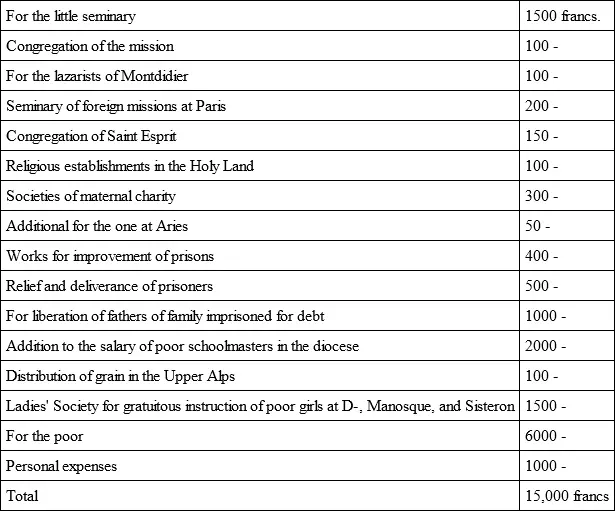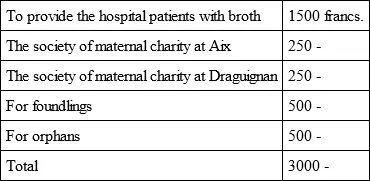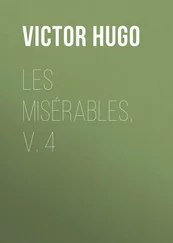Lascelles Wraxall - Les Misérables, v. 1
Здесь есть возможность читать онлайн «Lascelles Wraxall - Les Misérables, v. 1» — ознакомительный отрывок электронной книги совершенно бесплатно, а после прочтения отрывка купить полную версию. В некоторых случаях можно слушать аудио, скачать через торрент в формате fb2 и присутствует краткое содержание. Жанр: literature_19, foreign_antique, foreign_prose, на английском языке. Описание произведения, (предисловие) а так же отзывы посетителей доступны на портале библиотеки ЛибКат.
- Название:Les Misérables, v. 1
- Автор:
- Жанр:
- Год:неизвестен
- ISBN:нет данных
- Рейтинг книги:4 / 5. Голосов: 1
-
Избранное:Добавить в избранное
- Отзывы:
-
Ваша оценка:
- 80
- 1
- 2
- 3
- 4
- 5
Les Misérables, v. 1: краткое содержание, описание и аннотация
Предлагаем к чтению аннотацию, описание, краткое содержание или предисловие (зависит от того, что написал сам автор книги «Les Misérables, v. 1»). Если вы не нашли необходимую информацию о книге — напишите в комментариях, мы постараемся отыскать её.
Les Misérables, v. 1 — читать онлайн ознакомительный отрывок
Ниже представлен текст книги, разбитый по страницам. Система сохранения места последней прочитанной страницы, позволяет с удобством читать онлайн бесплатно книгу «Les Misérables, v. 1», без необходимости каждый раз заново искать на чём Вы остановились. Поставьте закладку, и сможете в любой момент перейти на страницу, на которой закончили чтение.
Интервал:
Закладка:
"Twenty-six, Monseigneur."
"The number I counted," said the Bishop.
"The beds are very close together," the Director continued.
"I noticed it."
"The wards are only bed-rooms, and difficult to ventilate."
"I thought so."
"And then, when the sun shines, the garden is very small for the convalescents."
"I said so to myself."
"During epidemics, and we have had the typhus this year, and had miliary fever two years ago, we have as many as one hundred patients, and do not know what to do with them."
"That thought occurred to me."
"What would you have, Monseigneur!" the Director said, "we must put up with it."
This conversation had taken place in the dining-hall on the ground floor. The Bishop was silent for a moment, and then turned smartly to the Director.
"How many beds," he asked him, "do you think that this room alone would hold?"
"Monseigneur's dining-room?" the stupefied Director asked.
The Bishop looked round the room, and seemed to be estimating its capacity.
"It would hold twenty beds," he said, as if speaking to himself, and then, raising his voice, he added, —
"Come, Director, I will tell you what it is. There is evidently a mistake. You have twenty-six persons in five or six small rooms. There are only three of us, and we have room for fifty. There is a mistake, I repeat; you have my house and I have yours. Restore me mine; this is yours."
The next day the twenty-six poor patients were installed in the Bishop's palace, and the Bishop was in the hospital. M. Myriel had no property, as his family had been ruined by the Revolution. His sister had an annuity of 500 francs, which had sufficed at the curacy for personal expenses. M. Myriel, as Bishop, received from the State 15,000 francs a year. On the same day that he removed to the hospital, M. Myriel settled the employment of that sum once for all in the following way. We copy here a note in his own handwriting.
NOTE FOR REGULATING MY HOUSEHOLD EXPENSES.

During the whole time he held the see of D – , M. Myriel made no change in this arrangement. He called this, as we see, regulating his household expenses. The arrangement was accepted with a smile by Mlle. Baptistine, for that sainted woman regarded M. Myriel at once as her brother and her bishop; her friend according to nature, her superior according to the Church. She loved and venerated him in the simplest way. When he spoke she bowed, when he acted she assented. The servant alone, Madame Magloire, murmured a little. The Bishop, it will have been noticed, only reserved 1000 francs, and on this sum, with Mlle. Baptistine's pension, these two old women and old man lived. And when a village curé came to D-, the Bishop managed to regale him, thanks to the strict economy of Madame Magloire and the sensible management of Mlle. Baptistine. One day, when he had been at D – about three months, the Bishop said, —
"For all that, I am dreadfully pressed."
"I should think so," exclaimed Madame Magloire. "Monseigneur has not even claimed the allowance which the department is bound to pay for keeping up his carriage in town, and for his visitations. That was the custom with bishops in other times."
"True," said the Bishop, "you are right, Madame Magloire." He made his claim, and shortly after the Council-general, taking the demand into consideration, voted him the annual sum of 3000 francs, under the heading, "Allowance to the Bishop for maintenance of carriage, posting charges, and outlay in visitations."
This caused an uproar among the cits of the town, and on this occasion a Senator of the Empire, ex-member of the Council of the Five Hundred, favourable to the 18th Brumaire, and holding a magnificent appointment near D – , wrote to the Minister of Worship, M. Bigot de Préameneu, a short, angry, and confidential letter, from which we extract these authentic lines:
" – Maintenance of carriage! what can he want one for in a town of less than 4000 inhabitants? Visitation charges! in the first place, what is the good of visitations at all? and, secondly, how can he travel post in this mountainous country, where there are no roads, and people must travel on horseback? The very bridge over the Durance at Château Arnoux can hardly bear the weight of a cart drawn by oxen. These priests are all the same, greedy and avaricious! This one played the good apostle when he arrived, but now he is like the rest, and must have his carriage and post-chaise. He wishes to be as luxurious as the old bishops. Oh this priesthood! My Lord, matters will never go on well till the Emperor has delivered us from the skullcaps. Down with the Pope! (there was a quarrel at the time with Rome). As for me, I am for Cæsar and Cæsar alone, etc., etc., etc."
The affair, on the other hand, greatly gladdened Madame Magloire. "Come," she said to Mlle. Baptistine, "Monseigneur began with others, but he was obliged to finish with himself. He has regulated all his charities, and here are 3000 francs for us at last!"
The same evening the Bishop wrote, and gave his sister, a note conceived thus: —
CARRIAGE AND TRAVELLING EXPENSES.

Such was M. Myriel's budget. As for the accidental receipts, such as fees for bans, christenings, consecrating churches or chapels, marriages, &c., the Bishop collected them from the rich with so much the more eagerness because he distributed them to the poor. In a short time the monetary offerings became augmented. Those who have and those who want tapped at M. Myriel's door, the last coming to seek the alms which the former had just deposited. The Bishop in less than a year became the treasurer of all charity and the cashier of all distress. Considerable sums passed through his hands, but nothing could induce him to make any change in his mode of life, or add the slightest superfluity to his expenditure.
Far from it, as there is always more wretchedness at the bottom than paternity above, all was given, so to speak, before being received; it was like water on dry ground: however much he might receive he had never a farthing. At such times he stripped himself. It being the custom for the bishops to place their Christian names at the head of their mandates and pastoral letters, the poor people of the country had selected the one among them which conveyed a meaning, and called him Monseigneur Welcome (Bienvenu). We will do like them, and call him so when occasion serves. Moreover, the name pleased him. "I like that name," he would say. "The Welcome corrects the Monseigneur."
We do not assert that the portrait we are here drawing is probably as far as fiction goes: we confine ourselves to saying that it bears a likeness to the reality.
CHAPTER III
A GOOD BISHOP AND A HARD BISHOPRIC
The Bishop, though he had converted his coach into alms, did not the less make his visitations. The diocese of D – is fatiguing; there are few plains and many mountains, and hardly any roads, as we saw just now: twenty-two curacies, forty-one vicarages, and two hundred and eighty-five chapels of ease. It was a task to visit all these, but the Bishop managed it. He went on foot when the place was near, in a carriage when it was in the plain, and on a mule when it was in the mountains. The two old females generally accompanied him, but when the journey was too wearying for them he went alone.
One day he arrived at Senez, which is an old Episcopal town, mounted on a donkey; his purse, which was very light at the time, had not allowed him any other equipage. The Mayor of the city came to receive him at the door of the Bishop's Palace, and saw him dismount with scandalized eyes. A few cits were laughing round him. "M. Mayor and gentlemen," the Bishop said, "I see what it is that scandalizes you. You consider it great pride for a poor priest to ride an animal which our Saviour once upon a time bestrode. I did so through necessity, I assure you, and not through vanity."
Читать дальшеИнтервал:
Закладка:
Похожие книги на «Les Misérables, v. 1»
Представляем Вашему вниманию похожие книги на «Les Misérables, v. 1» списком для выбора. Мы отобрали схожую по названию и смыслу литературу в надежде предоставить читателям больше вариантов отыскать новые, интересные, ещё непрочитанные произведения.
Обсуждение, отзывы о книге «Les Misérables, v. 1» и просто собственные мнения читателей. Оставьте ваши комментарии, напишите, что Вы думаете о произведении, его смысле или главных героях. Укажите что конкретно понравилось, а что нет, и почему Вы так считаете.












